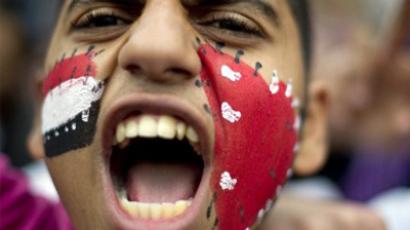Dirty warfare ignored by mainstream as Egypt votes
The Muslim Brotherhood claims it is leading the vote in the first parliamentary election since the fall of Mubarak. But many doubt whether it will change much, with the army generals who took over from the ousted president still holding the reins.
The first parliamentary election in years has attracted millions of Egyptians who have turned out to vote for their future. The ballots are still being counted, and the official results are expected to be announced on Thursday.Preliminary data indicates that the Muslim Brotherhood is leading the vote. According to the state-owned newspaper Al-Ahram, the Freedom and Justice party, a political branch of the brotherhood, is leading in six out of the nine Egyptian provinces. The Muslim Brotherhood earlier claimed that it was expecting to win at least 40 per cent of the seats in the parliament. Another leader is the ultra-conservative Nour party, which was established by the Salafi Islamist group. The Salafis asserted themselves during the January uprising and later joined the political coalition of the Muslim Brotherhood. But during the election campaign they separated over power-sharing disputes inside the coalition and made a solo debut in the elections.Authorities report unexpectedly high turnout reaching an estimated 70 to 80 per cent over the two days of voting. Some lines to the polling stations were several kilometers long.Five of the 10 Egyptian provinces have voted in the first round of the election. The country’s supreme election commission counts 17.5 million voters in those territories, with the total throughout Egypt number reaching more than 50 million.Some 1,000 complaints over violations have been filed, most over polling stations being unable to process all those who wanted to cast ballots due to shortages of ink and blank ballot papers. Doctors reported that some three dozen people, mostly elderly, required medical assistance. One person died from a cardiac arrest.The voting was marred by violence on Tuesday night, when nearly 80 people were wounded in clashes focused around a Cairo sit-in protest by activists demanding an end to army rule, Reuters reported.The next round of Egyptian election will take place on December 14-15. The third will be on January 3-4.The joy of people participating in Egypt’s future was palpable. But some say the election excitement and dreams of democracy could be overshadowing a harsh reality.They may be excited to be voting in a real election for real candidates, but they are electing a parliament that will have no power. The question is, does that make this part of a real transition from the old regime?“The problem is it’s going to produce a parliament that cannot appoint ministers, that cannot appoint a government. Whose constitution, whatever it turns out to be, is going to be guided by the army,” says Robert Fisk, Mid-East correspondent for The Independent newspaper.Some who understand this boycotted the poll, like Samira Ibrahim, a protester who knows all too well the old tactics are still rampant. A virginity test was performed on her and other women that protested on Tahrir Square long after Mubarak fell.She would not elaborate on the embracing procedure, but has something to say about the vote: “The main reason for holding the elections is for the military to hide their corruption and crimes,” she believes.Instead of voting, a group of protesters marched to call for justice and show solidarity for virginity test victims. There were few cameras and no Egyptian press.Fisk says the truth about the Egyptian elections is simple and unpleasant: “It remains a fact that both before during and after this election the ruler of Egypt is an unelected man called Field Marshall Mohamed Tantawi, and as long as he’s unelected this is not a democracy.”The West was quick to praise the election as a great step towards change. Which was quite expectable, Fisk says.“Although the Americans are beginning to say ‘well, no, the army must go back to barracks,’ deep down they’ll be perfectly happy to keep the army where it is in Egypt. If you give $1.3 billion a year to the Egyptian Army, which the Americans do, you expect it to do what it wants,” he explained.This leaves little room for the people to get what they want, and Egypt might be waking up from more of a nightmare than a sweet dream of democracy once election elation settles.
Dr. Ayman Salama, professor of international law at Cairo University, told RT that this is the most crucial time in Egypt’s contemporary history.He also expressed doubts that Egypt would turn into an Islamist state like Iran, nor would it become a Western-style democracy.














